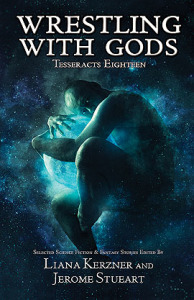 2016 was a game-changing year for my writing career. An editor who’d bought two of my previous short stories asked if I’d be interested in writing a novel or series of novels in a shared universe. I started the year as a published short story writer who wanted to write a novel, and I’m ending the year as a novelist under contract to deliver the first novel on January 1, 2017.
2016 was a game-changing year for my writing career. An editor who’d bought two of my previous short stories asked if I’d be interested in writing a novel or series of novels in a shared universe. I started the year as a published short story writer who wanted to write a novel, and I’m ending the year as a novelist under contract to deliver the first novel on January 1, 2017.
I’m also under a non-disclosure agreement, so I’m not free to give details, which is a big challenge when I can’t talk about what I’m thinking about all day!
Because my focus has been on novels, I’ve written fewer short stories this year. My first novel isn’t coming out until some time in 2018, and the meat of my payment will be from royalties, meaning it’s over a year until I actually see money for the majority of the work I’ve done. The good news on the money front is that I’m getting royalties from novelettes published this year and previous years, and I received some nice cheques from short story markets that pay pro rates. Overall, though, I still need my part-time job, and I’m very fortunate to not be the only income-earner in my household.
I’ve also had some interesting insights about living the dream.
I’m no longer as free to write whatever takes my fancy. I can’t spend so much time crafting a random idea into a short story and then look for a home for it, because I’m obligated to turn in a novel-length manuscript on a certain topic by a certain date.
Writers under contract still have to do laundry. I thought the entertainment industry would be more glamorous.
There’s a certain gratification that I don’t have to wonder about whether what I’m writing is ever going to find a publisher. I’ve got a folder of unsold short stories that represent several cumulative months of work for, as of yet, zero financial return. Of course, I also have a folder of sold short stories, but sometimes I’m surprised that stories I think are really strong are still in the zero folder, and I also have a “I got HOW MUCH for THAT?!” story on hand. With the novel, I have a signed contract saying that what I write is definitely going to be published (on the assumption that it meets the publisher’s standards). On the other hand, it’s in my best interests to deliver the best manuscript I can, not just something “good enough to publish.” This book is going to be a lot of readers’ first exposure to my work, and if I want them to buy Book 2, I will make Book 1 as good as I can possibly make it.
I had a big shock one day when I felt sore and tired and just wanted to rot my brain watching cartoons all day, but my common sense told me, “Hey, you have a novel deadline. You know you can’t do good work last-minute (since high school I’ve envied people who can). You better go write a thousand words BEFORE you put that DVD in.”
And my lizard brain snarled, “I hate having a book contract.”
WTF?! my consciousness said. You’ve wanted this for twenty years, and now that you have it, you hate it?
No, I don’t really hate it. I might have hated doing the responsible thing rather than the thing which would provide me with instant gratification, but I don’t regret my choice, because having a book contract is worth it.
On the other hand, for those aspiring writers out there: Do you know the feeling of knowing you have a project, an essay, a big term paper, a graduate thesis due? It’s going to feel like that for the rest of my life. Or at least as long as I have books under contract.
It’s strangely familiar. And it’s worth it.



